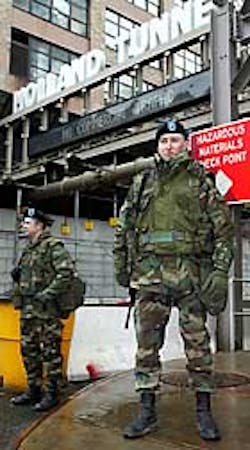New York City Goes on Highest Alert Ever
"We have every reason to feel safe and secure," Kelly told reporters after putting the NYPD's sweeping Operation Atlas plan into action - deploying special detection teams and heavily armed police officers, and setting up checkpoints around the city, including at all bridges and tunnels.
"I understand that some people might find these precautions intimidating or even frightening but, sadly, these measures are necessary to protect us," Kelly said.
In just over the first 14 hours of Operation Atlas, the NYPD conducted 1,700 vehicle examinations, investigated 16 unfounded bomb threats, and checked on 240 "signature" locations, such as hotels, places of worship and theaters, Kelly said.
Included in the operation are COBRA - Chemical, Biological or Radiological - response teams, Hammer teams, which are made up of NYPD and FDNY hazardous-materials experts, and the armed-to-the-teeth Hercules teams.
Mayor Bloomberg said the extraordinary lengths are a necessity because "we represent everything that the terrorists find threatening."
One of the most highly protected areas is the Financial District, which is "under intense, 24-hour coverage" because it's a "target repeatedly alluded to in al Qaeda threats," the NYPD said in a statement.
The FAA has instituted a no-fly area over Manhattan, and police and the military have beefed up air and harbor patrols, while the NYPD has assigned bomb-sniffing dogs to the Staten Island Ferry. Radiation detectors are being used in the subways, where undercover teams are now on patrol, the NYPD statement said.
Every police precinct has drawn up a list of "sensitive locations" in their confines that are now being watched or guarded closely, a police source said.
The NYPD said cops will avoid overstaffing personnel at emergency sites, because that could leave "parts of the city exposed."
"Terrorist groups may try to exploit this situation by staging a large diversionary event, only to be followed by a second, more serious one," the statement said.
